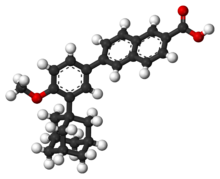Adapalene
 |
|
 |
|
| Clinical data | |
|---|---|
| Trade names | Differin, Teva, Pimpal, Gallet, Adelene, Adeferin |
| AHFS/Drugs.com | Monograph |
| MedlinePlus | a604001 |
| License data | |
| Pregnancy category |
|
| Routes of administration |
Topical |
| ATC code | |
| Legal status | |
| Legal status | |
| Pharmacokinetic data | |
| Bioavailability | Very low |
| Excretion | Biliary |
| Identifiers | |
|
|
| CAS Number | |
| PubChem CID | |
| IUPHAR/BPS | |
| DrugBank | |
| ChemSpider | |
| UNII | |
| KEGG | |
| ChEBI | |
| ChEMBL | |
| ECHA InfoCard | 100.149.379 |
| Chemical and physical data | |
| Formula | C28H28O3 |
| Molar mass | 412.52 g/mol |
| 3D model (Jmol) | |
|
|
|
|
Adapalene is a third-generation topical retinoid primarily used in the treatment of mild-moderate acne, and is also used off-label to treat keratosis pilaris as well as other skin conditions. It is effective against acne conditions where comedones are predominant.
It is used for the treatment of acne.
There is no evidence that the cream causes problems in the baby if used during pregnancy but this use has not been well studied.
Adapalene has been shown to enhance the efficacy of topical clindamycin, although adverse effects are also increased. Application of adapalene gel to the skin 3–5 minutes before application of clindamycin enhances penetration of clindamycin into the skin, which may enhance the overall efficacy of the treatment as compared to clindamycin alone.
Unlike the retinoid tretinoin (Retin-A), adapalene has also been shown to retain its efficacy when applied at the same time as benzoyl peroxide due to its more stable chemical structure.
Absorption of adapalene through the skin is low. A study with six acne patients treated once daily for five days with two grams of adapalene cream applied to 1000 cm² of skin found no quantifiable amounts, or less than 0.35 ng/mL of the drug, in the patients' blood plasma.
Unlike tretinoin, adapalene inhibits keratinocyte differentiation. This inhibition of keratinocyte differentiation and proliferation is responsible for adapalene’s comedolytic effect. It has both exfoliating and anti-inflammatory effects. In an in vivo study, adapalene’s ability to reduce comedo formation was demonstrated by a 50–60% reduction in comedo counts compared with vehicle.
Adapalene is a research product of Galderma Laboratories, France. Adapalene was approved in 1996 by the U.S. Food and Drug Administration (FDA) for use in the treatment of acne.
In the United States, adapalene is available under the brand name Differin in three different preparations: 0.1% cream, 0.1% gel, and 0.3% gel. The 0.1% gel is available as a generic made by Teva. It is also available combined with benzoyl peroxide under the brand name Epiduo. In Europe, only the 0.1% cream and 0.1% gel are available. Adapalene is currently marketed by Galderma under the trade names Differin in some countries, and Adaferin in India. It is mostly available in 0.1% w/w gel form.
...
Wikipedia
